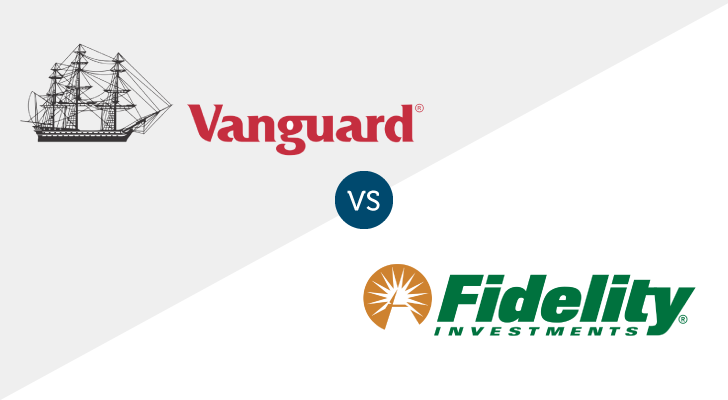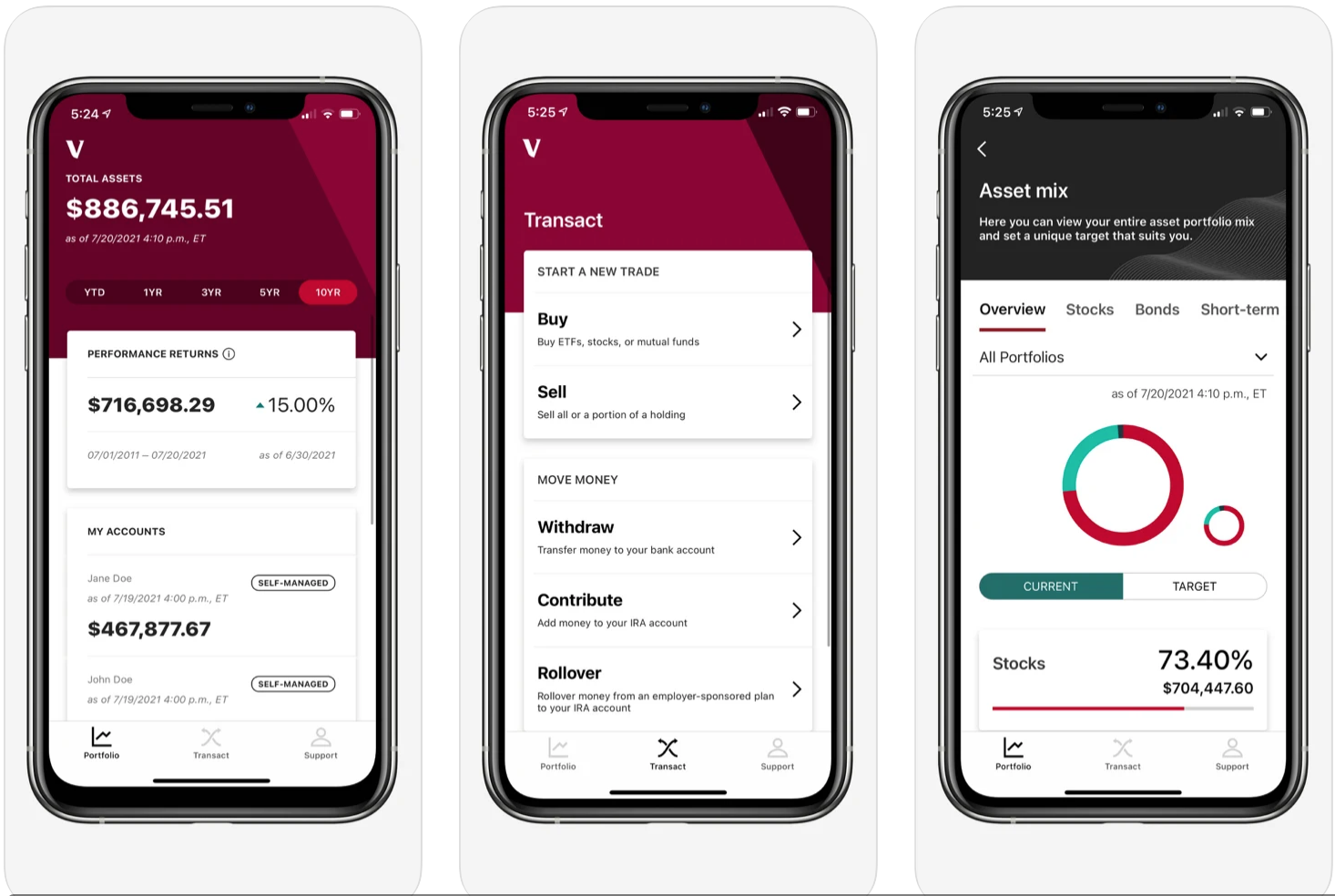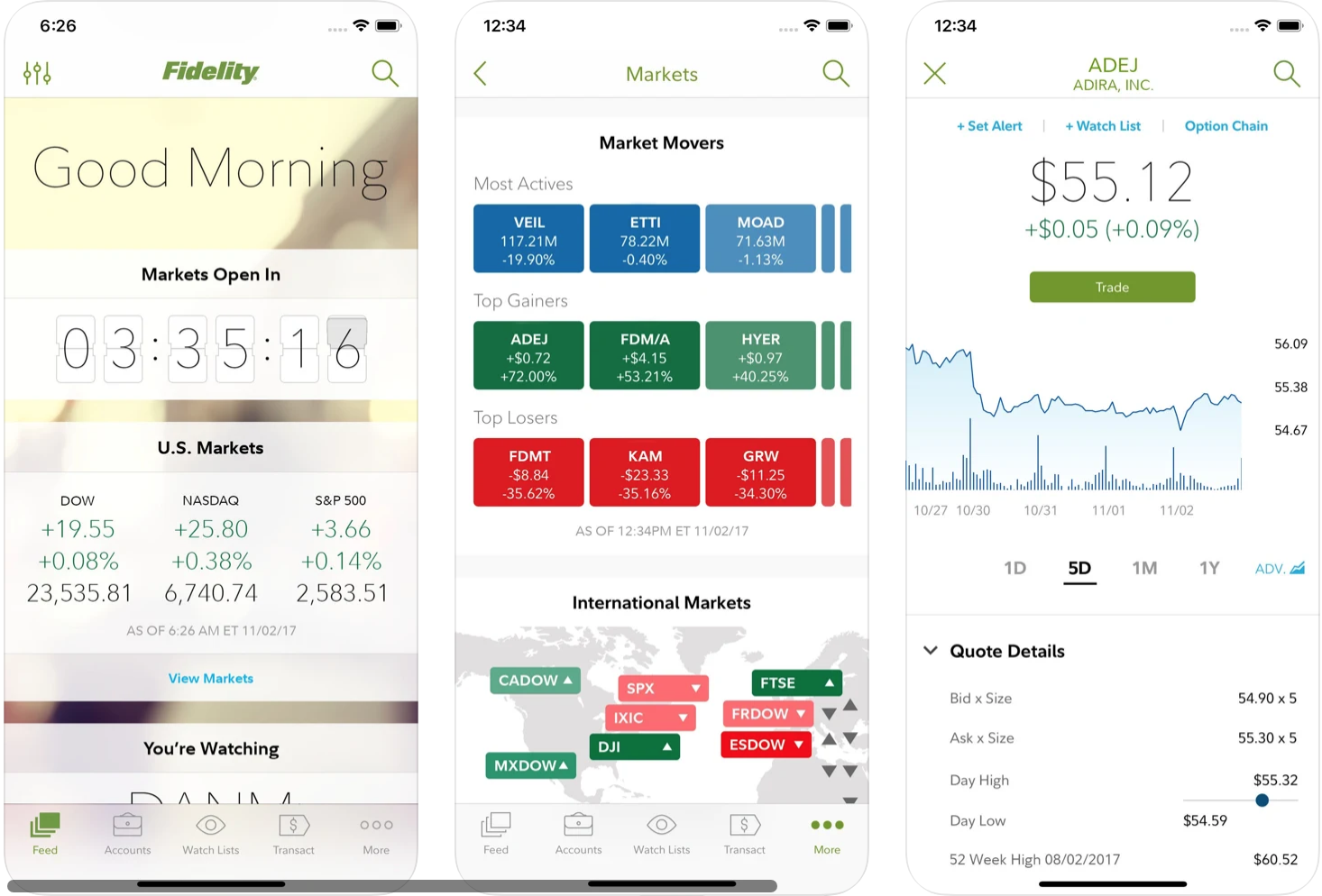
Vanguard and Fidelity are both major brokerage firms, with some of the largest client bases in the country. Each has broad financial offerings, from DIY brokerage accounts to financial advisors, robo-advisors and financial planning services. Vanguard is also widely known for its in-house selection of low-cost funds, as it runs a number of its own indexes. On the other hand, Fidelity offers in-depth investment tools that are great for veteran investors looking for the upper hand. Each option has its own strengths and weaknesses in terms of its fees, online experience and features. If you prefer to work with a financial professional, consider using SmartAsset’s free advisor matching tool.
Vanguard vs. Fidelity: Fee: An Overview
There aren’t many bigger names in the brokerage space than Vanguard and Fidelity. They consistently boast some of the largest client bases in the country and for good reason. Both brokerages have extensive investing tools and platforms that make managing your investments and financial plans much easier.
Vanguard has long been known for its wide range of in-house index funds and exchange-traded funds (ETFs). If you’re looking to invest in funds, going directly to a main provider like Vanguard can significantly lower your costs. That’s because Vanguard can afford to offer lower expense ratios than other brokerages that allow you to invest in third-party funds.
While Vanguard stands out with its suite of funds, the brokerage is more limited when it comes to other offerings. However, it does allow investors to trade individual stocks and bonds. Conversely, Fidelity allows clients to invest in individual stocks, bonds, ETFs, options, mutual funds and more.
Vanguard vs. Fidelity: Fees
Vanguard and Fidelity Fees
| Fee Type | Vanguard | Fidelity |
| Investment Fees | – Stocks & ETFs: $0 – Mutual funds: $0 ($20 for TF mutual funds) – Options: $0 commission and $1 contract fee – New issue bonds: $0 – Secondary market bonds: $1 per $1,000, plus $25 broker-assisted fee – CDs/U.S. Treasury securities: $0 – Mortgage-backed securities: $35 | – Stocks & ETFs: $0 – Mutual funds: $0 ($49.95 for TF mutual funds) – Options: $0 commission and $0.65 contract fee – New issue bonds: $0 – Secondary market bonds: $1 and $19.95 broker-assisted fee – CDs/U.S. Treasury securities traded online: $0 |
| Account Fees | – Account fee: $20 a year (waivable) – Wire transfer fee: $10 – Foreign securities transactions: $50 | – Account fee: $0 – Domestic wire transfer fee: $0 – Foreign exchange wire transfer fee: Up to 3% of principal – Foreign securities transactions: $50 |
Fees are important to consider when picking a brokerage firm to open an account with. You’ll want to make sure that the fees are fair and within your budget, as an overbearing fee structure will have a large negative effect on your portfolio.
A commission-lowering wave has struck brokerage firms over the last couple of years, and Fidelity and Vanguard have both followed suit. To trade stocks, ETFs, options and most mutual funds, clients of both firms will avoid commissions altogether. Options at Vanguard come with a $1 contract fee, while Fidelity charges an even lower $0.65 contract fee. There are also some transaction fee mutual funds that can incur costs, with Fidelity and Vanguard charging $49.95 and $20 for them, respectively.
For bonds, Fidelity’s commission is sometimes more expensive at $1, as well as a $19.95 fee if you initiate a broker-assisted transaction. Vanguard doesn’t charge fees for new issue bonds, but its secondary market bonds come with a $1 per $1,000 fee, plus a $25 broker-assisted fee if purchased over the phone.
In regards to account fees, Vanguard charges a $20 annual fee for brokerage and IRA accounts. On the other hand, Fidelity doesn’t charge anything. Vanguard has a few ways to waive this fee, including holding at least $10,000 in Vanguard ETFs and mutual funds, holding at least $50,000 in qualifying Vanguard assets, electing e-Statements or having an organization or trust account with a registered EIN.
Vanguard vs. Fidelity: Features
Both Fidelity and Vanguard have a wide variety of low-cost mutual funds and ETFs. If you’re simply looking at the options offered by each firm, Fidelity has more options available. Vanguard, which offers a total of more than 6,000 mutual funds, has about 3,000 no-transaction-fee mutual funds and 2,00 commission-free ETFs. Fidelity, which offers more than 10,000 mutual funds, has over 3,500 no-transaction-fee mutual funds.
However, when it comes to index funds, Vanguard offers the lowest expense ratio of any fund company on the market. Since Vanguard is essentially owned by its funds, which are then owned by the investors who hold the funds, expenses are minimized.
However, many firms are trying to compete with Vanguard’s low-cost funds. Therefore, you may be able to find other firms that have lower expense ratios. In fact, depending on the funds you want to invest in, Fidelity may have funds with lower expense ratios.
Additionally, Fidelity has $0 account minimums and has several funds that have no minimums as well. While Vanguard also has a $0 account minimum the company often has fund minimums. For its Investor Shares, the minimums range from $1,000 to $3,000, depending on the fund; for its Admiral Shares the minimums range from $3,000 to $100,000. Vanguard does not waive their minimums, even if you’re a repeat investor. However, Vanguard may lower the minimums depending on the type of account that holds the funds, such as an educational savings account.
When it comes to investment options, both firms have offerings that may be suitable for your portfolio. If you’re unsure which firm has funds that meet your budget and investment objectives, you can compare funds by using each broker’s fund screener.
Fidelity and Vanguard both offer robo-advisor services, educational tools and mobile apps to help you better manage your money. However, for those who want to actively trade, Fidelity offers Active Trader Pro. This service helps investors stream data and customize charting. Vanguard doesn’t have a similar service.
For people who want investment advice, Vanguard has a hybrid robo-advisor service known as Vanguard Personal Advisor Services. This service has algorithms that help with portfolio construction and asset allocation. They also offer human advisors via phone or online who can help answer financial planning questions and concerns. Vanguard requires a $50,000 account minimum for this service and charges a 0.30% annual management fee.
Vanguard also offers its Personal Advisor Select program for those with higher net worth. In fact, the minimum for this service is $500,000, though its annual fee remains at 0.30%. This is the most in-depth offering at Vanguard, as it pairs you with a dedicated advisor at the company. This will allow you to build a relationship with the advisor, as opposed to having various professionals work with you in the base program.
However, if you don’t have enough money to invest in Vanguard’s Personal Advisor Services program, it also offers Vanguard Digital Advisor. This program is a bit more basic than its counterpart, but it requires just a $3,000 minimum investment. Fees are nonexistent for your first 90 days as a client. Once that period ends, you’ll pay a 0.20% annual fee, which is again lower than Personal Advisor Services.
Fidelity also offers one robo-advisor service called Fidelity Go. This platform can be good for self-directed investors but also has brick-and-mortar locations where clients can find answers to some basic financial planning questions. If you don’t have a location in close proximity, you can also reach out to one of their call centers. There is no minimum for Fidelity Go, nor is there an annual fee if your account balance is less than $10,000. For accounts with a balance of $10,000 to $49,999, there’s a $3 monthly fee. Any accounts above $50,000 are charged a 0.35% annual fee.
Vanguard vs. Fidelity: Environmental, Social and Governance Issues
Both brokerages highlight their commitment to environmental, social and governance (ESG) issues by making mutual and exchange-traded funds (ETF) available to clients. Fidelity offers a long list of funds whose managers take ESG priorities into consideration as they build and maintain portfolios. Vanguard offers ESG funds that are indexed and follow an exclusionary strategy that omits companies that don’t meet certain ESG criteria. The brokerage firm also has three active funds that invest in companies with leading or improving ESG practices.
At the same time both firms have elected to either withdraw from or not affiliate with prominent ESG associations. In December 2022, Vanguard withdrew from the Net Zero Asset Managers Initiative (NZAM), an alliance of asset managers committed to supporting net-zero greenhouse gas emissions by 2050 or sooner. Also in late 2022, Fidelity joined other major financial institutions in choosing not to affiliate with the Glasgow Financial Alliance for Net Zero.
Vanguard vs. Fidelity: Advisory Services
Both firms offer the services of financial advisors. These are designed for those who want the highest-level packages of the firm, as you’ll get to work with an advisor in a hands-on manner Vanguard charges fees for its advisory services that are tailored to each client. The fee rate can vary depending on the complexity and size of the account, and the frequency at which clients pay will be specified in the initial advisory agreement.
The firm’s offshore clients will also have to pay various administrative and operational expenses that aren’t included in the standard advisory fees. Vanguard doesn’t charge performance-based fees, meaning clients’ fees won’t be dependent on any capital gains or the appreciation of assets.
The minimum for Fidelity’s advisory services begins at $50,000, which makes it readily accessible to investors of modest means. However, the firm also offers digital, discretionary investment management services with no minimum requirement and personalized and planning advice for a $25,000 minimum. For its private wealth management services, Fidelity requires clients to invest at least $2 million or more in investable assets.
Vanguard vs. Fidelity: Online and Mobile Experience
Both brokerages have robust online and mobile experiences. So while each firm has features and investments that favor specific types of clients, the quality of their tools and platforms is unquestionably strong.
Vanguard’s trading platform and apps are fairly basic, in keeping with the general aesthetic of the company. You can do everything you need to do as a low-level investor; make trades, buy mutual funds and check your performance. The platforms don’t have all the bells and whistles an experienced investor might want, but for someone who just wants to manage a few basic investments, it works.
Fidelity, on the other hand, has a more complicated and extensive online and mobile experience. While this may be a bit overwhelming for someone without a ton of investing experience, if you have been trading for a while, Fidelity may help you take your investing game to the next level.
In early May 2022, Vanguard’s mobile app has a major variance in its satisfaction level among users. For the Apple version, users rate it at 4.7 stars out of 5 across over 170,000 reviews. But on the Google Play store, Android users rate it at just 1.8 stars out of 5 across more than 7,612 reviews.
Fidelity’s mobile app has a higher level of user approval than Vanguard’s does. In fact, more than 1.9 million iPhone users rated the app with an average of 4.8 stars out of 5 in early May 2022. And the app also holds a respectable 4.3 stars out of 5 rating on the Google Play store across more than 111,615 reviews.
Who Should Use Vanguard?

Vanguard built a reputation as a platform that creates and offers low-fee mutual funds and exchange-traded funds. This makes it a good brokerage for clients who want to make basic investments and not think too much about them. In addition, if you want low-cost funds, Vanguard has also grown to offer stocks and bonds. However, trading these individual equities is much more limited.
Vanguard might also make sense for clients who want to open an IRA and manage it in a very hands-off manner. At its core, the brokerage is designed for investors who want a simple and straightforward experience. Its accounts and tools are easy to use, and its website boasts a number of educational resources. This makes it extremely welcoming to beginners.
Who Should Use Fidelity?

Fidelity is a robust trading platform that is known for its individual trading products, which include stocks and bonds.
Most clients would be happy with Fidelity, but it is especially suited for those with ample investing experience. Its advanced investment tools and platforms can be overwhelming if you’re a newbie. Beyond that, if you’re going to be making frequent trades, Fidelity could be a good choice out there.
While Fidelity does not charge much for its investment resources, it is also worth noting that other brokerages and broker-dealers are shifting to fee-free investment models.
Keeping this in mind, you’d be hard-pressed to find a better selection of high-level tools at an established brokerage. Many competitors have smaller pools of potential investments and less overall reliability than Fidelity.
Bottom Line

If you want to actively trade within your accounts, Fidelity might be the better option. However, if you want to focus more on index investing, or you want to use a robo-advisor, Vanguard has a slight edge. While both institutions offer robo-advisors, Vanguard’s Personal Advisor Services, which is available to clients who can meet a $50,000 account minimum, offers a little more hands-on investment guidance and assistance with portfolio construction. Vanguard also has slightly lower expense ratios on its index funds.
If you want help with financial planning, mutual funds or retirement and brokerage accounts, both have great options. It’s best to compare the costs and minimum account requirements of each firm and fund selection. By comparing your options you can discover the most suitable firm for your financial needs.
Tips for Investors
- Both Vanguard and Fidelity are attractive brokerages for retail investors, but there is still great value in also working with a financial professional. Finding a financial advisor doesn’t have to be hard. SmartAsset’s free tool matches you with up to three vetted financial advisors who serve your area, and you can have a free introductory call with your advisor matches to decide which one you feel is right for you. If you’re ready to find an advisor who can help you achieve your financial goals, get started now.
- If you decide to go with a brokerage, SmartAsset can recommend a few online options. Once you’ve considered the above factors and compared online brokerages, you’ll be in a position to find the right choice for you.
Photo credit: ©Vanguard/Fidelity, ©iStock.com/DNY59, ©Vanguard Beacon Apple Store Preview, ©Fidelity Investments Apple Store Preview, ©iStock.com/izusek
